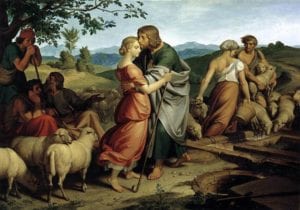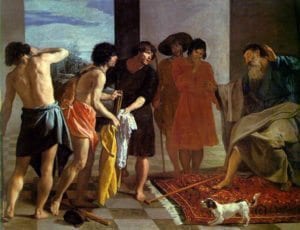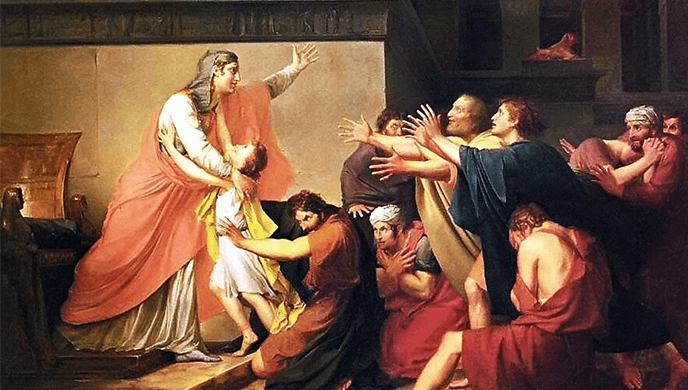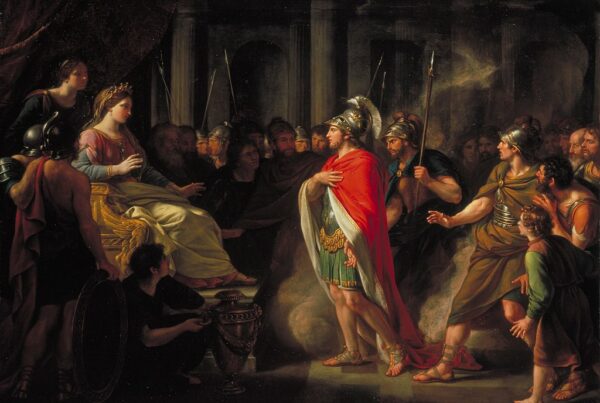My Twelve Sons: Home for the Holidays
By Bruce Lamott

Cast of Home for the Holidays, 1995
If we are to believe movies and television, holiday dinners are often served with a large dollop of family dysfunction along with the turkey and all the trimmings. Whether it’s Home for the Holidays or A Charlie Brown Thanksgiving, these family celebrations are a cornucopia of strained relationships, tableside zingers, and tongues untied by a glass too many of holiday cheer. But these stories pale in comparison to the jealousy, sibling rivalry and family deceptions recounted in the final chapters of the Biblical Book of Genesis that form the backstory to Handel’s oratorio Joseph and His Brethren.
As Joseph sees it, his father Jacob had already taken advantage of Grandfather Isaac’s failing eyesight by cheating Uncle Esau out of his birthright. Aided and abetted by the favoritism of Grandmother Rebekah, Jacob impersonates his elder brother’s hirsute body, deceiving his blind father to give him not only the blessing of the eldest son, but the rights and privileges of the pertaining thereto. Protecting Jacob from his brother’s angry wrath, Rebekah sends him off to live with her brother, Uncle Laban. Smitten there with his Cousin Rachel, Jacob agrees to work for his uncle for seven years to win her hand in marriage, but in a classic bait-and-switch, Uncle Laban substitutes his elder daughter, Cousin Leah, on their wedding night. Not to be deterred, Jacob works for yet another seven years for the hand of Rachel–seven years that certainly must have made things rather awkward with Leah, now his wife and sister-in-law elect.

Jacob Encountering Rachel with her Father’s Herds – Joseph von Führich, 1836
Then the Lord complicates the domestic turmoil by making Leah fecund and Rachel “barren.” Leah bears Jacob’s sons #1 Reuben, #2 Simeon, #3 Levi, and #4 Judah. Frustrated by her infertility, Rachel offers Jacob a surrogate in her maid, who bears him sons #5 Dan and #6 Naphtali. Leah, believing she had reached the end of her childbearing years, then offers her maid to Jacob, who fathers #7 Gad and #8 Asher with her. Leah then returns to the scene, however, and fortified by an aphrodisiac mandrake root, bears sons #9 Issachar, and #10 Zebulun. (And, finally, a daughter, Dinah, but that’s another story.)
“Then God remembered Rachel,” the Bible tells us, and she delivers Jacob son #11 Joseph. Jacob then alienates his twice-over father-in-law by attempting to flee from Uncle Laban, taking his family (i.e., Laban’s daughters, their maids, and his grandsons) his livestock, and–adding insult to injury– Laban’s household idols. Overtaken by Laban and Jacob’s irate cousins, Jacob makes a covenant with them and continues his family migration, finally appeasing his brother Esau along the way. Jacob then wrestles all night with a man, whom he coerces into giving him a blessing and a new name: Israel. The Lord later confirms this name with the promise that “a nation and a company of nations shall come from you, and kings shall spring from you.” En route to the land of Canaan, Rachel conceives once more but dies in the childbirth of Jacob’s son #12, Benjamin.
Thus a family Thanksgiving at the house of Jacob/Israel would be fraught with potential dysfunction: twelve men and boys from four different mothers, perhaps twenty years apart in age, six of whom know well that their father preferred their aunt to their mother. The Bible makes Jacob’s favoritism clear: “Now Israel loved Joseph more than any other of his children, because he was the son of his old age.”

Joseph’s Coat – Diego Velázquez, 1630
Thus bonded not only by virtue of being the youngest but also by their late mother’s preferential status, Joseph and Benjamin also receive the unmitigated favor of their aging father. Jacob lavishes the handsome 17-year-old Joseph with a luxurious robe with long sleeves (not of many colors or a Technicolor dreamcoat, by the way), as an indication of his exemption from manual labor. And the cocky teenager doesn’t help matters by telling his half-brothers that he dreams–literally– about them bowing down in submission to him. They just could have killed him. But they didn’t. Instead, they conspire to report his faked death to their heartbroken father, and sell Joseph instead to traveling merchants headed for Egypt.
It is here that Handel’s oratorio Joseph and His Brethren begins. Joseph has a few deceptions of his own in store that will (spoiler alert) eventually reconcile the familial dysfunctions of the children of Jacob, but not before he has the opportunity of punking his elder brothers.
See the drama unfold in Handel’s Joseph and his Brethren December 14-17, 2017






